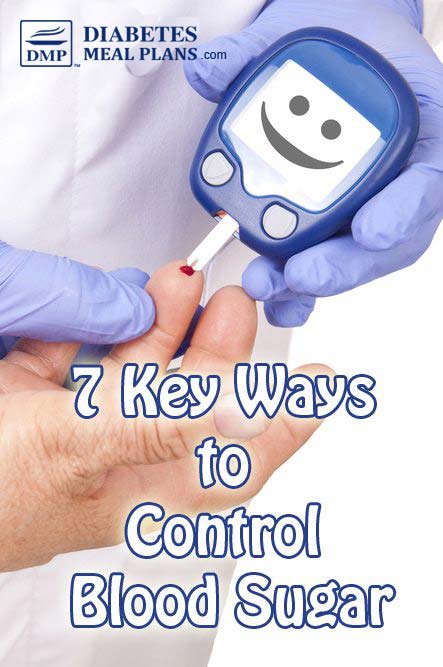Table of Contents[Hide][Show]
How is your blood sugar control?
More importantly, how is it compared to a year ago? Even slow progress in the right direction is a good sign.
Have you set a realistic goal for your blood sugar? Remember that if you don’t set goals, it’s hard to tell the degree of progress you’ve made.
Regardless of whether you’re a long way from a healthy range, have made leaps and bounds toward better glucose control, or are still in that prediabetes/ borderline range, we can all take certain steps to see improvements or to achieve maintenance.
I know that diet and food is the first thing that comes to mind when we talk blood sugar control–and for good reason as it is a very key factor!
However, it is only one of many influential factors. Remember that blood sugar is controlled by hormones, so anything impacting those hormones has potential to influence your blood sugar levels.
Let’s do a quick recap of the 7 key ways to control blood sugar.
1. Diet
Certainly the most obvious way to control blood sugar is with diet. Without a doubt, the foods you eat will probably play the most significant role when it comes to your blood sugar control. We bang this drum again and again, but that’s because it’s so important!
Eating a healthy whole foods diet and avoiding highly-processed and pre-packaged foods will address the majority of issues when it comes to confusion about specific nutrients. That said, having the right amount and type of carbohydrates is crucial.
Carbohydrates are the nutrient that impacts blood sugar the most, so carbohydrates is the top nutrient to focus on. While the exact number of carb grams varies from person to person, reducing the amount of carbohydrates you eat can improve control.

Not all carbs are created equal. Those that are higher in fiber and/or protein are always better options as they don’t elevated glucose as quickly and provide greater satiety. Non-starchy vegetables are the lowest carb-containing foods and should comprise the bulk of your diet in terms of volume.
Beans and lentils are starchy, but high in protein and fiber, which makes them a good option in small quantities.
White refined starches, higher starchy foods and veggies (potatoes, rice, pasta, bread), sugars and pre-packaged snack foods like chips should be avoided entirely.
Check out our diabetes friendly food list if you’re uncertain. Finally too much of a good thing can become a bad thing, so get familiar with portion control!
2. Exercise
Physical activity is so key to blood sugar control as well as overall health. Remember that our bodies were designed and created to move!
By depriving your body of exercise, you increase the risks for health-related complications.
Check out the benefits of exercise over here, including how much to include, types of activity and precautions to take with diabetes.
While it is possible to over-exert, most of us probably are on the other end of the spectrum and would benefit from adding in more exercise by adding either minutes daily or number of days per week. Gradual increases are usually most sustainable and realistic.
3. Weight
While this is a bit of an obvious one, it is important to mention. In one sense, weight is more of an effect rather than a controllable factor. For example, it is an outcome of the first two points we’ve talked about: diet and exercise.
In another sense, it is important to realize that weight, in and of itself, is a very important predictor of healthy outcomes in general, and diabetes specifically.
While we are seeing more and more pre-diabetes and type 2 diabetes in normal weight individuals, overweight and obesity remain the controllable top risk factor when it comes to diabetes.

I mention this specifically because it is possible to follow a healthy diet, exercise regularly and still be overweight or obese. The culprit could be found in excessive amounts of healthy fat foods and poor portion control.
While carbs matter most when it comes to blood sugar control, fat is still the highest calorie nutrient, providing more than 2x the amount of calories per gram as carbs and protein, so keep a close eye on your olive oil, nuts, seeds, avocados and so forth.
One of the common pitfalls of a lower carb diet is that people do eat too much fat. While healthy fats are good for us, you do need to ensure you eat lots of non-starchy vegetables. And if you choose to eat a lower carb diet, you can’t keep eating starchy carb foods (potatoes, rice, pasta, bread) and fat at the same time. Then you’re just eating a high carb, high fat diet.
If you’re finding your weight hasn’t budged after adhering faithfully to a lower carb diet, try shifting your balance of nutrients by adding more non-starchy vegetables and cutting back on the fat.
4. Sleep
Sleep is sadly underrated in our society of convenience, efficiency and work-a-holsim. For some reason we perceive it as an option, or even a luxury rather than a necessity.
However, studies and experience has shown us that is not the case. To the contrary, sufficient sleep (both quality and quantity) is required for optimal hormonal function.
We need to rest and reset overnight and inadequate sleep has been linked to excess hunger, inadequate satiety, and increased stress, resulting in a multitude of health related consequences – poor sugar control being one of them.
Check out this article for more information about how sleep impacts blood sugar and weight as well as some steps to take to improve your sleep.
5. Stress
Speaking of stress. It’s everywhere, is it not?
We all live with it to varying degrees. Occasional brief bouts of stress are not necessarily a bad thing especially when exercise is engaged to combat that ‘fight-or-flight” response.
However, long-term, low-grade stress is problematic as it puts the body in a constant state of inflammation. This can be in response to physical, psychological, or emotional stress causing a cascade of hormonal responses that results in higher glucose in the bloodstream to help ‘cope’ with the circumstance.
Check out this link to find out more about signs and symptoms of stress, how to respond, and some practical tips.
Remember that it is less about the circumstance itself, and more about the way you choose to respond to the circumstance which is something you CAN control.

6. Illness
Being sick is very tricky.
On the one hand, the body is in a state of inflammation. There may be fever and stress, all of which tend to elevate blood glucose.
On the other hand, you may not be eating very much and with vomiting or diarrhea may be losing nutrients and electrolytes resulting in lowered glucose.
To further complicate things, you may be on additional medications (see below) that may lower or raise glucose and/or impact medications you are taking for diabetes. The important thing to know is that being sick WILL impact your blood sugar, so it is important to keep this in mind and monitor more frequently.
7. Certain Medications
Some medications have a side effect of elevating glucose levels. Steroids are the most common and probably have the greatest effect, but many others may impact it as well.
Take a look at your medication list and review with your physician and/or pharmacist to see if any of what you’re taking might be impacting your blood sugars negatively. There may be alternative options available. Additionally, remember to look at all over the counter medications you may take. A cough drop or 2 here or there is not a big deal, but if you’re taking several daily, that sugar will add up over time.
What Next?
Do a little self-evaluation on each of these points, maybe even rating yourself on a scale of 1-10 with how well you’re doing.
It may be most helpful to tackle an area you haven’t explored much, especially if there is a lot of room for improvement. If it is the case that your carbs are in check and your diet is well-balanced, but you’re mostly sedentary, the biggest benefit may come from increasing your exercise…or tackling your stress.
Keep a journal, set some specific goals and stay accountable to someone…or us! We’re here to support you and want to hear about how you’re doing–your challenges, success, concerns, and questions!
Please share, pin, or tweet this post. :)


Lynda
I am 61 years young. Been on Keto diet since March 2018. In May my Fasting BS was 11.9. I was put on Metformin 2000 mg per day. Didn’t like the side effects! Then Aug. My non fasting A1C was 7.9. Dr. Told me that my diet is good and the supplement I am taking are all good, so she took me off Metf.
Them my morning blood sugar readings can anywhere from 140 to 250. I fast until 1 sometimes longer and my b s only comes down 20 points or less.
I am going to try to eat more meat and more greens and less fat to see if that is the cause.
Oh and I walk everyday and I am busy!
I do have some stress, but that is my life. I CAN’T CHANGE IT.
I HAVE BEEN DIABETIC FOR 12 YEARS.
THANKS LYNDA
Emily - Dietitian (MS, RD)
Hi Lynda, you’re goal is to maintain A1c under 6% and fasting blood sugar under 130mg/dL (ideally under 100 mg/dL). If you give up a little on your fat intake, it will give you room for some more vegetables- this is a low carb diet and this is more of what we recommend. By no means do you need to fear fat, but research shows that low carb diets produce the same results as keto diets, and low carb is much sustainable. Try sticking to foods from this list!
Specifically to help lower morning blood sugar you can find some more information in this article. Continue with the walking and do your best to manage stress.
Kim
Do you have diet plans for type 1 diabetes?
Jedha
Our main focus here is Type 2 at the moment Kim.
Maie
Thank you for continuing to send me the e-mails even though I have not answered you in a while.
I look forward to them and learn from them.
I am doing so well and I credit you and all the help and hints you gave me in the beginning of my journey. I will stay in touch and continue to keep learning.
marie
Elizabeth
That’s awesome Marie! I’m so glad you are doing well and that our site and information has been a helpful resource for you. However, I want to deter some of the credit to you as well….the hardest part is DOING it! Understanding what to do is relatively simple, putting into practice is a much greater challenge. Continue to learn as the more educated you are about the condition, the more empowered you are to make informed decisions regarding your health :-)
Brewster
We’re pretty good with diet, the most problematic times are the weekend. If I’ve had a bad food day I up the Metformin from 500mg to 625. I’ve had a low of 4.9 and a high of 6 in my home tests.
We go to the gym 5 days a week, Mon, Wed, Fri, in the morning, Tues and Thurs at night. On those two mornings and on the weekend we walk to the store, 9 blocks return. For me the gym is 1/2hr on the treadmill, 12 rep’s on five different exercise machines.
Not too shabby for a guy with two heart attacks, two bypass surgeries, and a stroke.
Elizabeth
Brewster–you’ve made a lot of progress by way of lifestyle choices! Be aware that metformin does not act with regard to food. All it does is stop excess sugar being released from the liver and muscle cells so taking additional metformin to make up for poor meal choices is probably not helping. Unless your doctor recommended it, I’d stick with a consistent dose and time.
Karen Tidwell
I’ve been following the low carb diet, but my blood sugar has been going up over the last week. It was 122 this morning, which has my husband and I really concerned. I exercise for at least a half hour daily, sleep well, am trying to lose weight, and doing everything else right. The only thing we can figure is my medication and the only one there is my abilfy which I have been taking for almost 7 years and my dosage is only 2mg daily. Would love some insight into what might be going on.
Elizabeth
Sorry to hear Karen-it’s hard to answer without knowing quite a bit more details. How long have you had diabetes and do you take anything to control it? Have your stress levels changed? 122 is in pre-diabetic range so while it isn’t optimal, I wouldn’t be extremely worried…what had it been running prior? I’d continue to monitor your numbers and see if it continues to trend upward, stabilize or return to normal. You may want to calibrate your meter with the control solution to ensure accuracy. Sounds like you are very conscious of lifestyle choices–I suspect your control would be much worse without them! (Abilify may have an effect on your glucose and weight, something to discuss with your physician; however, it shouldn’t account for a sudden increase if you’ve been taking the same dose for a long time)
Karen Tidwell
Elizabeth,
I’ve been in the pre-diabetic range but we are trying very hard not to become full blown diabetic, so no, I’m not taking anything to control it. My blood sugar had been trending upward, but it was back down this morning, to 112 which is still in the pre diabetic range, I know. have a physical in about two weeks and plan on talking to my doctor. Thanks for your input.